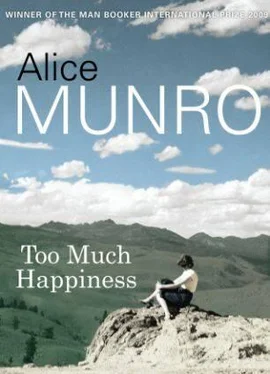“I got my work cut out for me getting these knots out of you today.”
And I heard Old Mrs. Crozier’s voice, full of her new displeasure.
“… punching harder than you normally do.”
“Well I gotta.”
I was headed upstairs when some further thoughts came to me.
If he and not I had locked the door-which was evidently what he wanted the others to think-and I had been sitting on the top step as usual, I would certainly have heard him and called out and roused the others in the house. So I went back down and sat on the bottom step of the front stairs, a place from which it could have been possible for me not to hear a thing.
The massage seemed to be brisk and businesslike today; they were evidently not teasing and making jokes. Pretty soon I could hear Roxanne running up the back stairs.
She stopped. She said, “Hey. Bruce.”
Bruce.
She rattled the knob of the door.
“Bruce.”
Then she must have put her mouth to the keyhole, hoping he could hear but nobody else could. I could not make out exactly what she was saying, but I could tell she was pleading. First teasing, then pleading. In a while she sounded as if she was saying her prayers.
When she gave that up she started pounding up and down on the door with her fists, not too hard but urgently.
After a while she stopped that too.
“Come on,” she said in a firmer voice. “If you got to the door to lock it you can get there to open it up.”
Nothing happened. She came and looked over the bannister and saw me.
“Did you take Mr. Crozier’s water into his room?”
I said yes.
“So his door wasn’t locked or anything then?”
No.
“Did he say anything to you?”
“He just said thanks.”
“Well, he’s got his door locked and I can’t get him to answer.”
I heard Old Mrs. Crozier’s stick pounding to the top of the back stairs.
“What’s the commotion up here?”
“He’s locked hisself in and I can’t get him to answer me.”
“What do you mean locked himself in? Likely the door’s stuck. Wind blew it shut and it stuck.”
There was no wind that day.
“Try it yourself,” said Roxanne. “It’s locked.”
“I wasn’t aware there was a key to this door,” said Old Mrs. Crozier, as if her not being aware could negate the fact. Then, perfunctorily, she tried the knob and said, “Well. It’d appear to be locked.”
He had counted on this, I thought. That they would not suspect me, thinking of his being in charge. And in fact he was.
“We have to get in,” said Roxanne. She gave a kick to the door.
“Stop that,” said Old Mrs. Crozier. “Do you want to wreck the door? You couldn’t get through it anyway; it’s solid oak. Every door in this house is solid oak.”
“Then we have to get the police.”
There was a pause.
“They could get up to the window,” said Roxanne.
Old Mrs. Crozier drew in her breath and spoke decisively.
“You do not know what you are saying. I won’t have the police in this house. I won’t have them climbing all over my walls like caterpillars.”
“We don’t know what he could be doing in there.”
“Well, then, that’s up to him. Isn’t it?”
Another pause.
Now steps-Roxanne’s-retreating to the back staircase.
“Yes, you better,” said Mrs. Crozier. “You better just take yourself away before you forget whose house this is.”
Roxanne was going down the stairs. A couple of stomps of the stick went after her but did not continue down.
“And don’t get the idea you’ll go to the constable behind my back. He’s not going to take his orders from you. Who gives the orders around here anyway? It’s certainly not you. You hear me?”
Very soon I heard the kitchen door slam shut. And then Roxanne’s car start.
I was no more worried about the police than Old Mrs. Crozier was. The police in our town meant Constable McClarty who came to the school to warn us about sledding on the streets in the winter and swimming in the millrace in summer, both of which we continued to do. It was ridiculous to think of him climbing up on a ladder or lecturing Mr. Crozier through a locked door.
He would tell Roxanne to mind her own business and let the Croziers mind theirs.
It was not ridiculous, however, to think of Old Mrs. Crozier giving orders, and I thought she might do so now that Roxanne-whom she apparently did not like anymore-was gone. She might turn on me and demand to know if I had anything to do with this.
But she did not even rattle the knob. She just stood at the locked door and said one thing.
“Stronger than you’d think,” she muttered.
Then made her way downstairs. The usual punishing noises with her steady stick.
I waited awhile and then I went out to the kitchen. Old Mrs. Crozier wasn’t there. She wasn’t in either parlor or in the dining room or the sunroom. I got up my nerve and knocked on the toilet door, then opened it, and she was not there either. Then I looked out the window over the kitchen sink and I saw her straw hat moving along slowly above the cedar hedge. She was out in the garden in the heat, stumping along between her flower beds.
I was not worried by the thought that had troubled Roxanne. I did not stop to consider it, because I believed that it would be quite absurd for a person with only a short time to live to commit suicide. It could not happen.
All the same, I was nervous. I ate two of the macaroons that were still sitting on the kitchen table. I ate them hoping that pleasure would bring back normalcy, but I barely tasted them. Then I shoved the box into the refrigerator so I would not hope to turn the trick by eating more.
Old Mrs. Crozier was still outside when Sylvia got home. And she didn’t come in then.
I got the key from between the pages of the book as soon as I heard the car and I gave it to Sylvia as soon as she was in the house. I just told her quickly what had happened, leaving out most of the fuss. She would not have waited to listen to that, anyway. She went running upstairs.
I stood at the bottom of the stairs to hear what I could hear.
Nothing. Nothing.
Then Sylvia’s voice, surprised and upset but in no way desperate, and too low for me to make out what she was saying. Within about five minutes she was downstairs, saying it was time to get me home. She was flushed as if the spots in her cheeks had spread all over her face, and she looked shocked but unable to resist her happiness.
Then, “Oh. Where is Mother Crozier?”
“In the flower garden, I think.”
“Well, I suppose I better speak to her, just for a moment.”
After she had done that, she no longer looked quite so happy.
“I suppose you know,” she said as she backed out the car, “I suppose you can imagine Mother Crozier is upset. Not that I am blaming you. It was very good and loyal of you. Doing what Mr. Crozier asked you to do. You weren’t scared of anything happening? With Mr. Crozier? Were you?”
I said no.
Then I said, “I think Roxanne was.”
“Mrs. Hoy? Yes. That’s too bad.”
As we were driving down what was known as Croziers’ Hill she said, “I don’t think he wanted to be mean and frighten them. You know when you’re sick, sick for a long time, you can get not to appreciate other people’s feelings. You can get turned against people even when they’re so good and doing what they can to help you. Mrs. Crozier and Mrs. Hoy were certainly trying their best, but Mr. Crozier just didn’t feel that he wanted them around anymore. He’d just had enough of them. You understand?”
She did not seem to know she was smiling when she said this.
Mrs. Hoy.
Had I ever heard that name before?
Читать дальше












